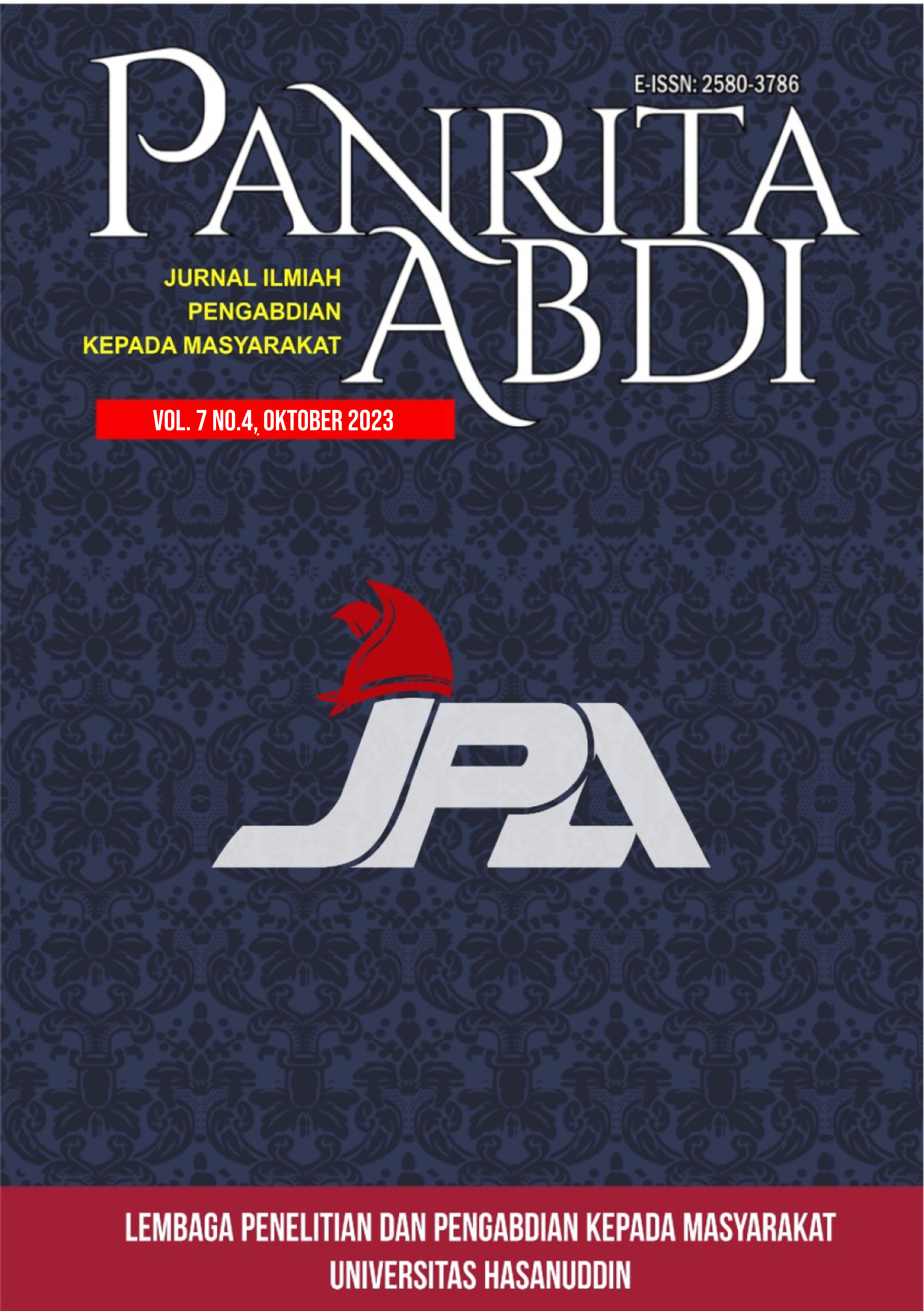PROGRAM PEMBINAAN MUSLIMPRENEURSHIP TERHADAP UMKM BERBASIS DIGITAL
DOI:
https://doi.org/10.20956/pa.v7i4.19255Keywords:
Muslimpreneurship, MSME, digital platformAbstract
As a solution to the problems of MSMEs, there are two programs carried out, namely: 1) Hard skills program, which includes training in business management, financial management, halal production management, as well as marketing concepts consisting of brands, sales, and services. 2) Soft skills program that provides Muslimpreneurship values. Provision of a digital marketplace platform used to implement product marketing. The digital marketplace platform serves not only to bring together sellers and buyers but also to bring together investors. The primary purpose of this community service is to improve hard and soft skills to answer the main problems of MSMEs: 1). Legal aspects and 2) Unprofessional business management problems. The service method used is training, followed by implementation on the digital marketplace that has been provided. The training is carried out with a Muslimpreneurship approach for Forbis Alumni Greeone MSME Group Partners. Partners are a collection of MSME entrepreneurs whose majority members are SMPN 1 Cimahi. The results of the activities, in general, have increased hard and soft skills. Hard skill improvement increases knowledge and skills, including a digital understanding of technology, marketing concepts, entrepreneurship, halal product processes, and improving business performance. Soft skills improve by forming a positive entrepreneurial character, namely an ethical and good reputation and better customer service. --- Sebagai solusi permasalahan UMKM ada dua program yang dilakukan yaitu:1) Program hardskill yang meliputi pelatihan pengelolaan usaha, pengelolaan keuangan, pengelolaan produksi halal, serta konsep pemasaran yang terdiri dari brand, sales dan services. 2) Program softskill dengan memberikan pembekalan nilai-nilai muslimpreneurship. Penyediaan platform digital marketplace yang digunakan sebagai sarana untuk implementasi pemasaran produk. Platform digital marketplace selain berfungsi untuk mempertemukan penjual dan pembeli, juga untuk untuk mempertemukan pemodal. Tujuan utama dari pengabdian masyarakat ini yaitu meningkatkan kemampuan hardskill dan softskill sehingga dapat menjawab permasalahan utama UMKM yaitu: 1). Aspek legalitas dan 2) Permasalahan manajemen usaha yang belum profesional. Metode pengabdian yang digunakan adalah pelatihan kemudian dilanjutkan dengan implementasi pada digital marketplace yang telah disediakan. Pelatihan dilakukan dengan pendekatan muslimpreneurship. Kegiatan dilakukan terhadap Mitra Kelompok UMKM Forbis Alumni Greeone. Mitra adalah kumpulan pengusaha UMKM yang mayoritas anggotanya adalah alumni SMPN 1 Cimahi. Hasil kegiatan secara umum ada peningkatan baik secara hardskill maupun softskill. Peningkatan secara hardskill yaitu peningkatan pengetahuan dan keterampilan yang meliputi pemahaman mengenai teknologi digital, konsep pemasaran, kewirausahaan, proses produk halal serta peningkatan kinerja usaha. Peningkatan secara softskill meliputi terbentuknya karakter kewirausahaan yang positif yaitu beretika dan bereputasi baik serta pelayanan konsumen yang lebih baik.Downloads
References
Aziz, Y. A., & Chok, N. V. (2013). The Role of Halal Awareness, Halal Certification, and Marketing Components in Determining Halal Purchase Intention Among Non-Muslims in Malaysia: A Structural Equation Modeling Approach. Journal of International Food and Agribusiness Marketing, 25(1), 1–23. https://doi.org/10.1080/08974438.2013.723997
CNN Indonesia. (2020). Belanja Online Naik 400 Persen Saat Musim Corona, 2020. Retrieved from https://www.cnnindonesia.com/ekonomi/20200707172450-92-521925/belanja-online-naik-400-persen-saat-musim-corona
KemenKUKM. (2018). Perkembangan Data Usaha Mikro , Kecil , Menengah Dan Usaha Besar. Www.Depkop.Go.Id, 2000(1), 1.
LIPI. (2020). Survei Kinerja UMKM di Masa Pandemi COVID19. Retrieved from http://lipi.go.id/berita/survei-kinerja-umkm-di-masa-pandemi-covid19/22071
Nurlatifah, H., Syahriar, A., Lubis, A. H., & Parwati, N. (2019). The Development of Muslimpreneur Model in Indonesia. In International Council for Small Business,2019 Congress Proceeding. Cairo.
Ratten, Vanessa ; Ramadani, Veland; Dana, Le´o-Paul ;Tahiri, S. (2015). The context of Islamic entrepreneurship and business: Concept, principles and perspectives. International Journal of Business and Globalisation, 244–261.
Razdan, R., Potia, A., Wintels, S., & Dadwal, R. (2020). Perspectives on Covid-19 and implications for consumer and retail companies by McKinsey & Company in association with MMA MMA Webinar Series. Retrieved from https://www.mmaglobal.com/files/webinars/20200408_-_indonesia_consumer_covid-19_impact_and_response_-_webinar_vshare.pdf
Rohita, M. R. (2021). Peningkatan Pengetahuan dan Kemampuan Orangtua dalam Menanamkan Nilai Tauhid pada Anak Usia Dini Increased Knowledge and Ability of Parents to Embed Tauhid Value in Early Childhood. Panrita Abdi, 5(3), 282–292.
Solomon, R. C. (1997). It’s Good Business Ethics and Free Enterprise for the New Millennium. Austin, Texas: Rowman & Littlefield Publishers.
Yuswohady, Fatahilah, F., Rachmaniar, A., & Hanifah, I. (2020). Consumer Behaviour New Normal after COVID-19. Inventure Knowledge, 1–40.
Downloads
Published
How to Cite
Issue
Section
License
Copyright (c) 2023 Hanny Nurlatifah, Bambang Eko Samiono, Dody Haryadi

This work is licensed under a Creative Commons Attribution-NonCommercial-NoDerivatives 4.0 International License.



















